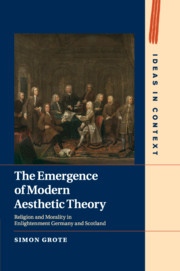
-
Select format
-
- Publisher:
- Cambridge University Press
- Publication date:
- October 2017
- October 2017
- ISBN:
- 9781316275559
- 9781107110922
- 9781107527706
- Dimensions:
- (228 x 152 mm)
- Weight & Pages:
- 0.58kg, 308 Pages
- Dimensions:
- (229 x 152 mm)
- Weight & Pages:
- 0.46kg, 308 Pages
- Subjects:
- History of Philosophy, History of Ideas, History, Philosophy, History of Ideas and Intellectual History
- Series:
- Ideas in Context (117)
You may already have access via personal or institutional login- Subjects:
- History of Philosophy, History of Ideas, History, Philosophy, History of Ideas and Intellectual History
- Series:
- Ideas in Context (117)
Book description
Broad in its geographic scope and yet grounded in original archival research, this book situates the inception of modern aesthetic theory – the philosophical analysis of art and beauty - in theological contexts that are crucial to explaining why it arose. Simon Grote presents seminal aesthetic theories of the German and Scottish Enlightenments as outgrowths of a quintessentially Enlightenment project: the search for a natural 'foundation of morality' and a means of helping naturally self-interested human beings transcend their own self-interest. This conclusion represents an important alternative to the standard history of aesthetics as a series of preludes to the achievements of Immanuel Kant, as well as a reinterpretation of several canonical figures in the German and Scottish Enlightenments. It also offers a foundation for a transnational history of the Enlightenment without the French philosophes at its centre, while solidly endorsing historians' growing reluctance to call the Enlightenment a secularising movement.
Awards
Winner, 2017 István Hont Book Prize, Institute of Intellectual History, University of St Andrews
Reviews
‘To be sure, Simon Grote’s The Emergence of Modern Aesthetic Theory is an erudite, elaborate, and mature scholarly work.’
Endre Szécsényi Source: The British Journal of Aesthetics
Contents
Metrics
Altmetric attention score
Full text views
Full text views help Loading metrics...
Loading metrics...
* Views captured on Cambridge Core between #date#. This data will be updated every 24 hours.
Usage data cannot currently be displayed.
Accessibility standard: Unknown
Why this information is here
This section outlines the accessibility features of this content - including support for screen readers, full keyboard navigation and high-contrast display options. This may not be relevant for you.
Accessibility Information
Accessibility compliance for the PDF of this book is currently unknown and may be updated in the future.


